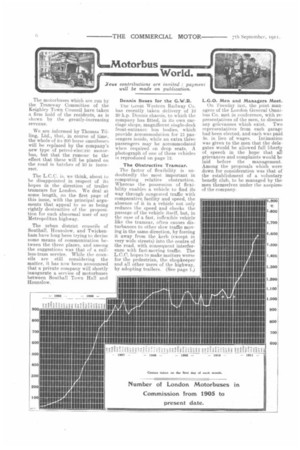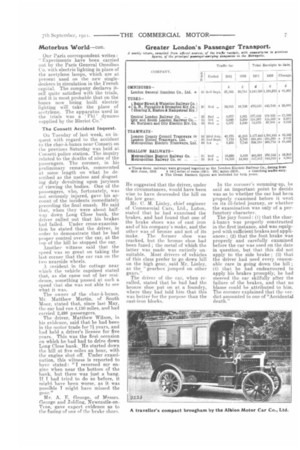World.
Page 6

Page 7

If you've noticed an error in this article please click here to report it so we can fix it.
41 ews contributions are invited : payment will be made on publication.
The motorbuses which are run by the Tramway Committee of the Keighley Town Council have taken a firm hold of the residents, as is shown by the greatly-increasing revenue.
We are informed by Thomas Tilling, Ltd., that, in course of time, the whole of its 200 horse omnibuses will be replaced by the company's new type of petrol-electric motorbus, but that the rumour to the effect that these will be placed on the road in batches of 50 is incorrect.
The L.C.C. is, we think, about to he disappointed in respect of its hopes in the direction of trailer tramcars for London. We deal at some length, on the first page of this issue, with the principal arguments that appeal to us as being rightly destructive of the proposition for such abnormal user of any Metropolitan highway.
The urban district councils of Southall, Hounslow, and Twickenham have long been trying to devise some means of communication between the three places, and among the suggestions was that of a railless-tram service. While the councils are still considering the matter, it has now been announced that a private company will shortly inaugurate a service of motorbuses between Southall Town Hall and Hounslow. Dennis Buses for the G.W.R.
'The Ureat Western Railway Co. has recently taken delivery of 10 20 h.p. Dennis chassis, to which the company has fitted, in its own carriage shops, magnificent single-deck front-entrance bus bodies, which provide accommodation for 13 passengers inside, while an extra three passengers may be accommodated when required on drop seats. A photograph of one of these vehicles is reproduced on page 12.
The Obstructive Tramcar.
The factor of flexibility is undoubtedly the most important in computing relative obstruction. Whereas the possession of flexibility enables a vehicle to find its way through congested traffic with comparativt. facility and speed, the absence of it in a vehicle not only reduces the speed and checks the passage of the vehicle itself, but, in the case of a fast, inflexible vehicle like the tramcar, often causes disturbances to other slow traffic moving in the same direction, by forcing it away from the kerb (except in very wide streets) into the centre of the road, with consequent interference with fast-moving traffic. The L.C.C. hopes to make matters worse for the pedestrian, the shopkeeper and all other users of the highway, by adopting trailers. (See page 1.) L.G.O. Men and Managers Meet.
On Tuesday last, the joint managers of the London General Omnibus Co. met in conference, with representatives of the men, to discuss any grievances which exist, Two representatives from each garage had been elected, and each was paid
5s. in lieu of wages. Intimation was given to the men that the delegates would be allowed full liberty of speech in the hope that all grievances and complaints would be laid before the management. Among the proposals which were down for consideration was that of the establishment of a voluntary benefit club, to be managed by the men themselves under the auspices of the company.
Our Ps,ris correspondent writes : "Experiments have been carried out by the Paris General Omnibus Co. with h electric lighting in place of the acetylene lamps, which are at present used on the new singledeckers in circulation in the French capital. The company declares itself quite satisfied with the trials, and it is most probable that on the buses now being built electric lighting will take the place of acetylene. The apparatus used in the trials was a Phi' dynamo supplied by the Bleriot Co."
The Consett Accident Inquest.
On Tuesday of last week, an inquest with regard to the accident to the char-a-bancs near Consett on the previous Saturday was held at Con sett police station. The inquiry related to the deaths of nine of the passengers. The coroner, in his preliminary remarks, commented at some length on what be described as the useless and disgusting duty devolving upon Jurymen of viewing the bodies. One of the passengers, who, fortunately, was not seriously injured, gave his account of the incidents immediately preceding the final smash. He said that, when they were about halfway down Long Close bank, the driver called out that his brakes had failed. Under eross-examination he stated that the driver, in order to demonstrate that he had proper control over the car, at the top of the hill he stopped the ear.
Another witness said that the speed was so great on taking the last corner that the car ran on the two nearside wheels.
resident in the cottage near which the vehicle capsized stated that, as she came out of her resi-deuce, something passed at such a speed that she was not able to see what it was.
The owner of the char-à-bancs, Mr. Matthew Martin, of South Moor, stated that, since last. May, the ear had run 4,150 miles, and had carried 2,498 passengers. The driver, Matthew Wilson, in his evidence, said that he had been in the motor trade for 71 years, and had held a driver's licence for five years. This was the first occasion on which he had had to drive down Long Close bank. He started clown the hill at five miles an hour, with the engine abut off. Under examination, this witness is reported to have stated: "I reversed my engine when near the bottom of the bank, but there was just a bang. If T had tried to do so before, it might have been worse, as it, was possible T might have missed the gear."
Mr. A. E. George. of Messrs. George and Jobling, Newcastle-onTyne, gave expert. evidence as to the fusing of one of the brake shoes. He suggested that the driver, under the circumstances, would have been wise to have descended the hill on the low gear.
Mr. C. M. Linley, chief engineer of Commercial Cars, Ltd., Luton, stated that he had examined the brakes, and had found that one of the brake shoes was of cast iron and of his company's make, and the other was of bronze and not of its make. The former shoe was cracked, but the bronze shoe had been fazed ; the metal of which the latter was made was entirely unsuitable. Most. drivers of vehicles of this class prefer to go down hill on the high gear, said Mr. Linley, as the "gearbox jumped on other gears."
The driver of the car, when recalled, stated that he had had the bronze shoe put on at a foundry, where they had told him that this was better For the purpose than the cast-iron blocks.
In the coroner's summing-up, be said an important point to decide was as to whether the car bad been properly examined before it went on its ill-fated journey, or whether the examination was only of a perfunctory character.
The jury found: (1) that the charii-bancs was properly constructed in the first instance, and was equipped with sufficient brakes and appliances; (2) that the foot brake was properly and carefully examined before the car was used on the date in question, but that. this did not apply to the side brake ; (3) that the -driver had used every reasonable care in going down the hill ; (4) that he had endeavoured to apply his brakes promptly, he had steered the car skilfully after the failure of the brakes, and that no blame could be attributed to him. The coroner explained that the verdict amounted to one of "Accidental death."




















